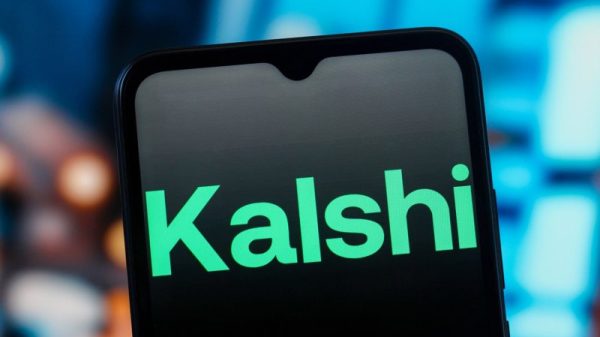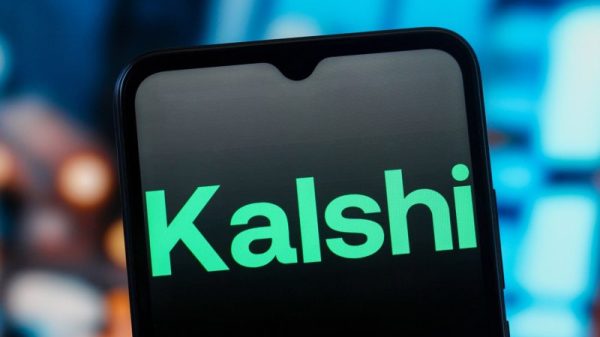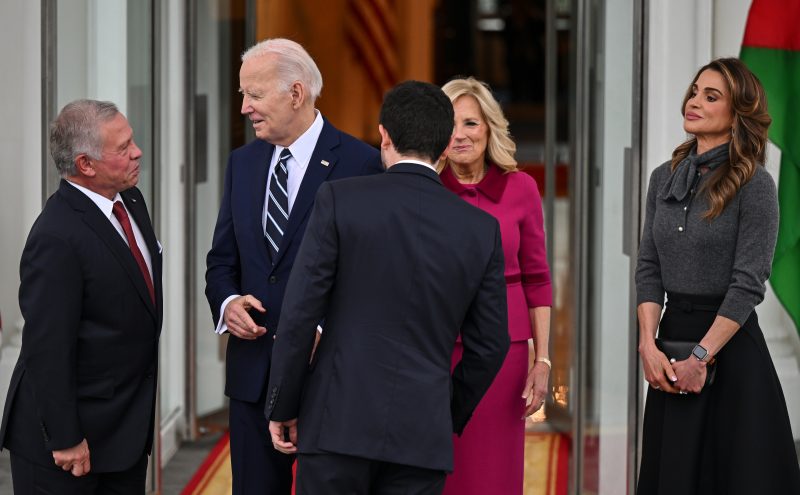President Biden and Jordan’s King Abdullah II, speaking jointly at the White House Monday, warned against an indiscriminate Israeli invasion of Rafah in southern Gaza, creating an event that had not occurred since the Israel-Hamas war began more than four months ago–the president standing alongside an Arab leader to voice reservations about the Israeli onslaught in the Palestinian enclave.
“The major military operation in Rafah should not proceed without a credible plan to ensure the safety and support of more than 1 million people sheltering there,” Biden said, referring to Israel’s stated plans to invade the city. “Many people there have been displaced — displaced multiple times, fleeing the violence to the north. And now they’re packed into Rafah, exposed and vulnerable. They need to be protected.”
Abdullah was more direct. “We cannot afford an Israeli attack on Rafah. It is certain to create another humanitarian catastrophe,” the king said. Referring to the war more broadly, he added, “We cannot stand by and let this continue. We need a lasting ceasefire now. This war must end.’
U.S. officials privately have told members of Congress that Israel is not close to exterminating Hamas more than 100 days into its campaign, according to officials familiar with the briefing, who spoke on condition of anonymity to describe a private exchange.
Still, Biden himself has not publicly called for a ceasefire, saying Israel must be allowed to defend itself by rooting out and destroying Hamas’s base of operations in Gaza. But his willingness to stand alongside an Arab leader who did issue such a call was notable.
The joint comments came after Biden met privately with Abdullah at the White House, the first face-to-face meeting the president has held with an Arab leader since the Israel-Gaza war began in October. The meeting came as U.S. officials have expressed deep concern about Israel’s plans to target the tiny town of Rafah, which borders Egypt and where about 1.3 million Palestinians are living in decrepit conditions after fleeing there under Israeli orders.
Still, Biden and his top aides have made clear they do not support restricting or conditioning any aid Israel — and have not warned of taking any actions to hold them accountable if the military offensive goes against their warnings to protect civilians taking refuge in Rafah.
Israeli airstrikes in an overnight operation in Rafah to rescue two hostages killed at least 67 Palestinians, including women and children, according to the Gaza Health Ministry, raising fears that a sustained Israeli operation there could kill and injure thousands more who have nowhere left to go in Gaza. The planned Rafah operation has also escalated fears of the forced displacement of tens of thousands of Palestinians, as Arab leaders fear they will be pushed into Egypt’s Sinai — a move far-right cabinet ministers of Israeli prime minister Benjamin Netanyahu’s government have openly called for.
Biden reiterated Monday that he and his top aides are working urgently to negotiate a six-week pause in the fighting between Israel and Hamas in exchange for the release of the remaining Israeli hostages, saying that could lay the groundwork for a permanent end to the war.
At a time when Biden has faced increasing criticism from Arab-American and Muslim voters angry over his staunch support for Israel and what they describe as a lack of empathy for Palestinians affected by the war, Biden found in Abdullah a welcome ally. He took the opportunity to highlight the suffering of the Palestinians, saying they are facing “unimaginable pain” and adding, “It’s heartbreaking. Every innocent life [lost] in Gaza is a tragedy, just as every innocent life lost in Israel is a tragedy as well.”
Jordan, whose population is composed of ethnic Palestinians, will be key to any long-term U.S. diplomatic ambitions in the Middle East. Biden has said the war in Gaza must be followed by planning for a Palestinian state, a notion forcefully rejected by Netanyahu. The U.S. believes that will require reforming the Palestinian Authority, which governs part of the West Bank, and Jordan is likely to be central to any such effort.
In recent days, Biden has shown more willingness to take aim at the Israeli military operation in Gaza, but for months Arab leaders in the U.S. and the Middle East have felt his public comments allowed for little criticism of the hard-hitting military campaign.
Abdullah, whose wife, Queen Rania, is Palestinian, is one of few people who can speak to Biden in detail about the suffering in Gaza, said Bruce Riedel, a senior fellow at the Brookings Institution who has worked on Middle East issues in multiple U.S. administrations.
More than 28,000 Palestinians have been killed by Israeli airstrikes and raids, according to the Gaza Health Ministry. In addition, more than 80 percent of the territory’s residents have been displaced, and an Israeli siege has put hundreds of thousands of residents at risk of famine and disease. Israeli officials have resisted repeated U.S. calls to allow more humanitarian aid into the enclave. Adding to the challenges are Israeli protesters who have blocked aid trucks from getting in to Gaza through the country’s Kerem Shalom crossing with the enclave.
Biden and Abdullah have known each other for more than 20 years and have deep affection for one another, according to aides to both men. As vice president, Biden oversaw the Iraq portfolio and made more than a dozen trips to the country. On each of those trips – either on the way over or the way back home – Biden stopped in Amman to visit Abdullah, Riedel said.
In the first months of his presidency, Biden demonstrated support for Abdullah after his half-brother threatened to destabilize the monarchy. Biden called the king immediately after the incident and voiced his full support for Abdullah — a move that the monarchy was deeply grateful for, experts said.
That long-standing relationship gave Abdullah a rare opportunity to speak in detail to Biden about the immense suffering in Gaza and appeal to his compassionate side, Riedel said.
“Abdullah can talk about all these issues in a level of candor that few other Arab leaders can because he knows Biden – they’ve been around together for a long time,” Riedel said. “I think he can be much more direct and candid. Part of the king’s objective here is to appeal to the empathetic part of Joe Biden and get him to show some empathy with the Palestinian people, which Biden needs to do for his own domestic political reasons.”
Abdullah’s visit to Washington comes at a precarious time in the war, when Biden is closer than ever to a breach with Netanyahu over the high civilian toll, disagreements on humanitarian aid, and Netanyahu’s rejection of a Palestinian state. More immediately, U.S. officials are highly concerned about Netanyahu’s announcement of the upcoming military operation in Rafah.
Biden, as he stood outside the White House awaiting Abduallah’s arrival, was asked if Netanyahu was listening to his advice.
He smiled broadly and said, “Everybody does.”
Abdullah’s visit to Washington is part of his tour of the United States, Canada, France and Germany, part of his effort to mobilize international support for an immediate ceasefire in Gaza, as well as the protection of civilians and for more humanitarian aid. Abdullah is also expected to meet senior administration officials, including Secretary of State Antony Blinken on Tuesday, as well as members of Congress.
Abdullah also spoke to Biden about rising violence in the West Bank, as U.S. and Arab leaders fear another front in the war could open up as tension boils. More than 370 Palestinians — including about 100 children — have been killed in violent clashes with Israeli in the West Bank, including East Jerusalem, according to the United Nations Office for the Coordination of Humanitarian Affairs. The vast majority have been killed by Israeli forces, but some have been killed by violent settlers. Biden issued an executive order earlier this month sanctioning four West Bank settlers for violence against Palestinians.
The meeting on Monday was also the first visit since three U.S. military members were killed last month in an attack on an outpost north eastern Jordan. Biden blamed Iranian-backed militias for the killings, which launched a round of retaliatory strikes.





























